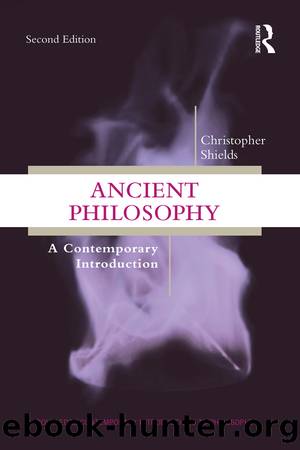Ancient Philosophy by Christopher Shields;

Author:Christopher Shields;
Language: eng
Format: epub
Publisher: Taylor & Francis Ltd
Published: 2023-12-15T00:00:00+00:00
(AEC) is a certain kind of refutation, one which begins by entertaining the hypothesis advanced by the opposition. The opposition say there is no change and try to induce us to understand that our beliefs to the contrary are false. So, they try to induce us to change our beliefs. If so, then they try to induce us to do what they say is impossible: to change. Now, they may back away at this point and try to suggest that we do not really have false beliefs about the natural world at all. It only seems to us that we believe that it changes. Aristotleâs response to this retort is two-fold. First, he notes that the senses really do seem to record motion and change. When I turn the page of a book, it seems to change directly before my eyes. So, it is hard to take seriously the suggestion that things do not even seem to me to change. Second, Aristotle notes that the entire apparatus of forming beliefs, whether true or false, or of engaging in other forms of mental activity implicates us in changing: mental changes are changes no less than physical changes. If we imagine something, we change; in general, if we come to think anything at all, then we change from the state we were in before we were thinking it. So, insofar as our opponent wishes us to reject all forms of a posteriori justification, which is precisely what Parmenides had recommended, she wishes us to form a belief counter to what the senses enjoin us to believe. She wishes us, that is, to change our minds.12
The crux of Aristotleâs argument is (AEC-3), the premise that even our belief formations count as changes. If this contention is correct, it forces Aristotleâs opponents into an awkward position. For it forces them to appreciate that their point of view is self-undermining, that a necessary condition of the truth of their approach is its falsehood. The argumentative strategy proves to be quite a powerful tool for Aristotle when attempting to refute his opponents on foundational points which seem to defy direct argumentation. (He uses a similar strategy against those who deny the principle of non-contradiction, the principle that nothing can be both F and not-F at the same time in the same respect. He agrees that no one could argue directly for any such principle, since an argument for its truth would need to employ it and so, in that sense, make no progress. Still, if someone claims that this principle is false, then they claim something definite and not its opposite. If so, then even in issuing their claim, the denial of the principle of noncontradiction, they presuppose its truth. So, a condition of asserting the falsity of the principle of non-contradiction is an acquiescence in its truth. If someone, in response, then refrains from asserting the falsity of the principle of non-contradiction, Aristotle has nothing to say to them.)13 However that may be, in the
Download
This site does not store any files on its server. We only index and link to content provided by other sites. Please contact the content providers to delete copyright contents if any and email us, we'll remove relevant links or contents immediately.
The European Opportunity by Felipe Fernández-Armesto(569)
The European History Highway: A Guide to Internet Resources by Dennis A. Trinkle Scott A. Merriman(535)
Morgan Kaufmann Digital Watermarking and Steganography by Ingemar Cox Matthew Miller Jeffrey Bloom Jessica Fridrich Ton(528)
The Seven Wonders of the Ancient World by Michael Denis Higgins(521)
Hyperculture by Byung-Chul Han(509)
European Security in a Global Context by Thierry Tardy(505)
European Security without the Soviet Union by Stuart Croft Phil Williams(505)
The Routledge companion to Christian ethics by D. Stephen Long Rebekah L. Miles(498)
Get Real with Storytime by Julie Dietzel-Glair & Marianne Crandall Follis(443)
Hudud Al-'Alam 'The Regions of the World' - a Persian Geography 372 A.H. (982 AD) by V. V. Minorsky & C. E. Bosworth(436)
Gorbachev And His Generals by William C. Green(428)
Tibetan Studies in Comparative Perspective by Chih-yu Shih Yu-Wen Chen(427)
Governance, Growth and Global Leadership by Espen Moe(418)
How Languages Are Learned 5th Edition by Patsy M Lightbown;Nina Spada; & Nina Spada(407)
CliffsNotes on Fitzgerald's The Great Gatsby by Kate Maurer(400)
The Oxford History of the World by Fernández-Armesto Felipe;(388)
The Egyptian Economy, 1952-2000 by Khalid Ikram(379)
Oral Poetry and Narratives from Central Arabia: The Poetry of Ad-Dindan : A Bedouin Bard in Southern Najd (Studies in Arabic Literature, Vol 17) (English and Arabic Edition) by P. M. Kupershoek P. Marcel Kurpershoek(365)
The Oxford Handbook of the Incas by Sonia Alconini(364)
